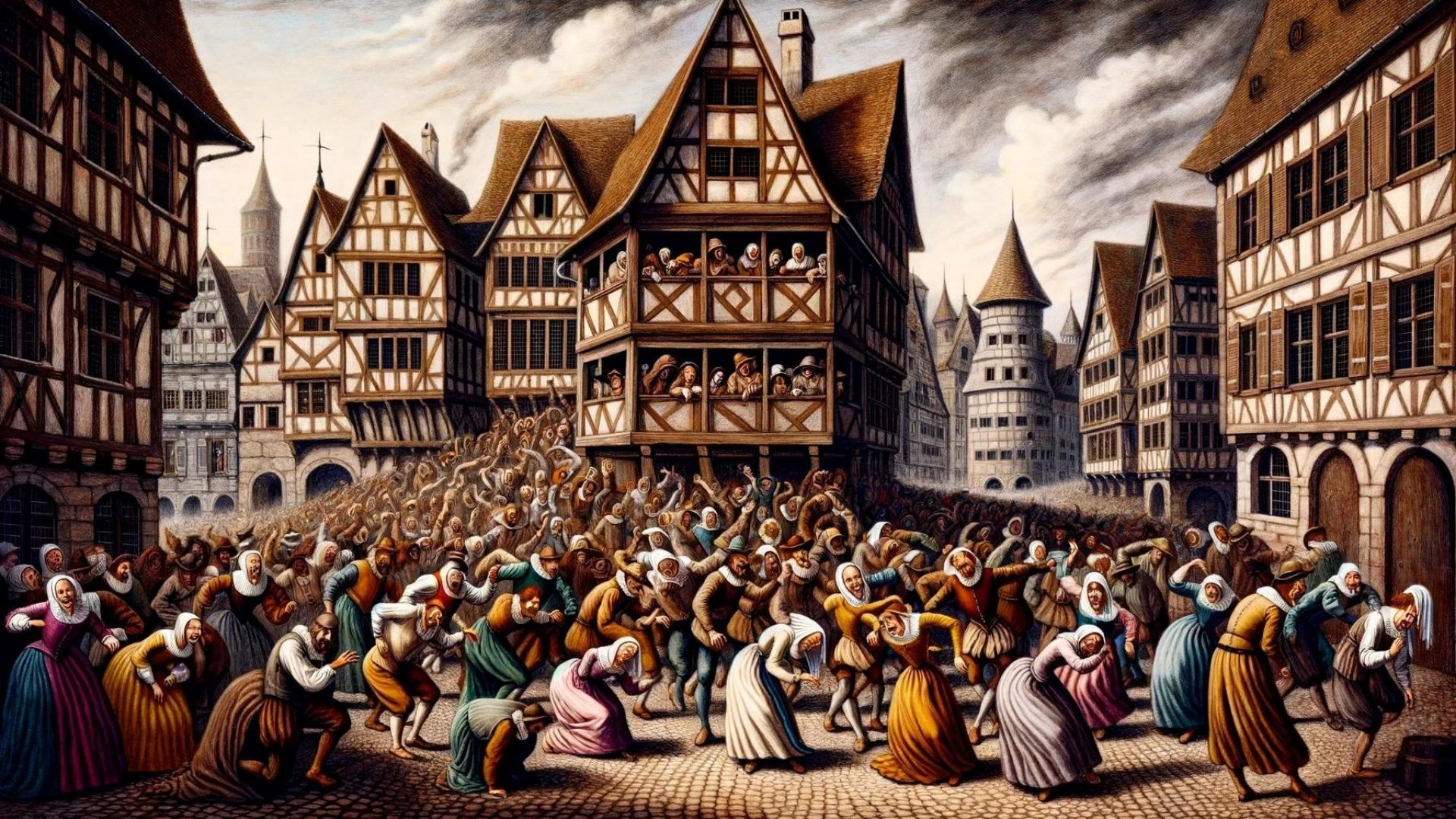Article Audio
Setting the Stage: A Suffering Town
Imagine Strasbourg, France, in July 1518. It’s a hard time. Disease and famine stalk the streets. Superstition and religious fervor run high. Suddenly, a woman named Frau Troffea begins to dance in the street. Fervently, uncontrollably, for hours on end. And that’s just the beginning…
The Plague of Movement
Within a week, dozens more are dancing – day and night, unable to stop. Weeks later, their ranks swell into the hundreds. Dancers collapse from exhaustion, some suffer heart attacks or strokes. Many simply dance until their feet bleed.
Desperate authorities are clueless. Is it a physical disease? Some bizarre curse? They try everything: bleeding the afflicted (bad idea!), isolating them, even hiring musicians to play them into exhaustion (also didn’t work).
Theories Through the Ages
The dancing plague eventually faded after months, but its mystery remains. Here’s what could have been at play:
- Ergot Poisoning: Fungus on rye bread can cause hallucinations and convulsions. But does it explain the non-stop dancing?
- Mass Hysteria: Extreme stress and shared anxieties can lead to outbreaks of unusual collective behavior in tight-knit communities.
- Religious Fervor: Could some form of extreme religious ecstasy, fueled by the fear-laden times, have played a role?
The Eerie Legacy
The Dancing Plague of 1518 is like a fragment from a nightmare. It raises chilling questions:
- The Mind’s Vulnerability: Are we truly in control of our own bodies? Can social and psychological forces override our will in such shocking ways?
- History’s Blind Spots: How many other strange outbreaks have been lost to time, leaving us to puzzle over the inexplicable?
- The Need for Understanding: Even if we never fully solve the mystery, such outbreaks remind us how much remains yet to be known about the human mind and body.
Though unsettling, the Dancing Plague serves as a chilling reminder that the boundaries of reality are blurrier than we often realize.
Think about the following:
- Search for historical accounts of the 1518 dancing plague. Witness the chilling, firsthand descriptions of the event.
- Could the modern world experience such a phenomenon? In what form?
- How does this historical event make you reflect on the relationship between mind and body?
Let’s discuss this strange and fascinating moment in time. Share your thoughts and theories in the
Why Should You Care?
- Human Vulnerability: This bizarre outbreak exposes the fragility of the human mind and body, and how even our basic movements can get out of our control.
- History isn’t Neat: These events make us question how well we truly understand the past, full of unexplained phenomena lost to time.
- Power of Psychology: The potential for mass hysteria or shared psychosis is chilling, even relevant in the age of social media and misinformation.
- Unexplained = Fascinating: It’s a rabbit hole of theories and “what ifs”, forcing us to ponder the limits of medical and historical knowledge.
Key Takeaways
- Bizarre Events Happened: History isn’t all kings and battles; it’s full of the strange, unsettling, and sometimes inexplicable.
- Multiple Causes Likely: The answer probably lies in a blend of factors: poisoning, pre-existing anxieties, religious beliefs…it’s complex!
- Context is Key: The hardship in Strasbourg in 1518 set the stage for this event – desperation makes people suggestible.
- Mystery Remains Alluring: There’s no definitive answer, forcing us to grapple with ambiguity and the limits of our understanding.
Keywords with Definitions
- Dancing Plague: Historical term for outbreaks of compulsive, uncontrollable dancing, like the most noted one in 1518.
- Strasbourg: The French city where the 1518 event occurred.
- Hysteria: Exaggerated, uncontrollable fear or emotional frenzy, often contagious within a group.
- Psychosis: A state of mind where a person loses touch with reality, experiencing hallucinations or delusions.
- Ergot: A fungus that grows on rye, known to cause poisoning with symptoms like tremors, spasms, and hallucinations.
- Famine: Extreme scarcity of food in a region, widespread and causing starvation and death.
- Superstition: Beliefs in supernatural causes or events, often unscientific, prevalent in periods of high fear and uncertainty.
- Convulsions: Involuntary and violent physical contractions of muscles, like seizures.
- Exhaustion: Extreme physical or mental fatigue, a factor in the deaths associated with the dancing plague.
- Social Contagion: The spread of behaviors through a group, fueled by emotional suggestibility within a population.
Frequently Asked Questions (FAQs)
Could similar outbreaks happen today?
Less likely in its extreme form, but modern mass psychogenic illness (physical symptoms with psychological origins) occur.
Did anyone enjoy the dancing?
Some reports suggest a trance-like state, potentially a coping mechanism within the mania.
Were similar ‘plagues’ common?
Records exist of other smaller-scale dancing outbreaks throughout medieval Europe.
Myth Buster
Myth: The afflicted were just faking it or seeking attention.
Reality: While some individuals may have exaggerated symptoms, the scale and severity make mass faking improbable.
Let’s Talk!
- Have you heard of other bizarre, unexplained events from history? Share your favorites!
- If you witnessed something like the dancing plague, would you assume a physical or a psychological cause first?
- How does learning about this challenge your ideas about the past?
Let’s keep the conversation – and the mystery – going in the comments below!










0 Comments